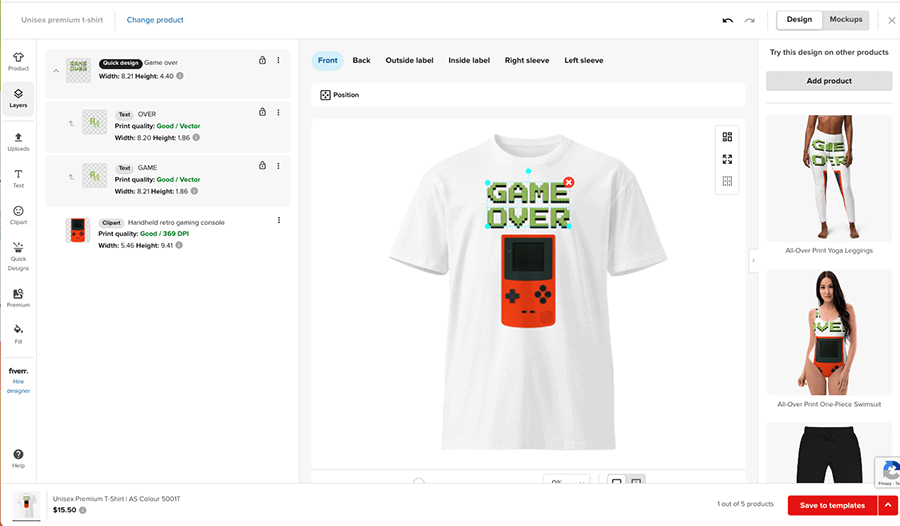
Thanks to a proliferation of apps designed to help you sell products online, ecommerce is easier than ever. But working out what to actually sell can be very tricky! So, in this post I’m going to spell out some of my favorite ecommerce business ideas.
I want to begin by making something clear: what you won’t find in this post is an endless list of items you can sell online — there are plenty of those sort of articles available elsewhere.
Instead, what you’ll find is a list of 10 key approaches to ecommerce that you should consider when starting an online business. In fact, a few of them don’t even involve selling your own products at all.
Let’s kick things off with a look at a very low-risk way to get started with online selling: print on demand.
1. Sell print-on-demand (POD) products
Print-on-demand services (like Printful or Printify) give you a low-risk, easy way to create unique products without needing to buy or store any inventory. Think t-shirts, wall art, mugs, tote bags, phone cases and much else besides.

You simply upload your designs to your chosen print-on-demand service and pick the products you’d like them printed on; you’re then given access to mockups of your items that can be displayed on your own online store.
Whenever somebody buys one of your products, it is made — or ‘printed’ — and then shipped to the customer by the POD service. (And you pocket the markup on the product).
💡 Tip: you can learn how to start a print on demand business here.
2. Dropship
Like print-on-demand, dropshipping gives you a way to sell online where you don’t buy, make or ship any products yourself. Instead, you list products from other suppliers on your store; and when somebody buys one, the order is automatically passed onto a supplier (for example AliExpress or Spocket) who then fulfils it.
With dropshipping, you can sell pretty much anything under the sun, and like print on demand, the lack of upfront costs make it a very low risk business model. But in order to make this sort of ecommerce business work, you’ll need to find a profitable niche — typically via good keyword research — where you don’t face too much competition.
3. Create digital products
One of my favorite types of ecommerce businesses is a digital products business. Selling downloads like ebooks, music, online courses or software can be very profitable — and relatively easy to do.
Digital product businesses are often easy to maintain too: once you’ve created your digital product, there are no manufacturing or production costs to worry about (you might have to update your product periodically, but you won’t be dealing with complex supply chains, or having to constantly negotiate product prices with manufacturers).
💡 Tip: you can learn more about how to sell digital products here.
4. Offer subscriptions
Selling subscriptions can be an extremely good way to generate revenue online — because they involve recurring fees.
You can start a subscription-based ecommerce business using either physical or digital goods.
If going down the physical product route, you typically curate a selection of products to send to subscribers on a regular basis. Popular options here include food, drink and books.

Digital subscriptions typically involve providing access to gated content for a recurring fee, or emailing your subscribers your latest digital products (music, ebooks, articles etc.) periodically.
Shopify and Squarespace are good options for selling physical item subscriptions (although note that you’ll need to add a dedicated subscription app if using Shopify, while Squarespace gives you a built-in one).
With member area and paywall features that are designed to help you monetize digital content easily, Squarespace is a popular option for setting up digital product subscriptions; Patreon can also be a good choice here too, as it’s a well-known solution for providing gated content to users, and people trust it.
Free ecommerce kit 🖥️💰
While you’re here, check out our free ecommerce kit. It’s packed with useful resources on setting up an online business, along with trials and offers for popular ecommerce apps.
5. Sell niche products
As I mentioned above, thanks to the huge range of online selling apps that new merchants now have access to, you can start selling anything you like easily and quickly.
But so can everyone else.
So, in order to have the best chance of succeeding in ecommerce, it’s usually quite important to focus fairly heavily on niche products — items that don’t have the biggest audience, or a huge number of merchants selling them, but in which there is keen (ideally fanatical!) interest.
This means offering products relating to very specific interests and hobbies; handmade goods; a clothing line in a very specific fashion style; antiques etc.
💡 Tip: identifying a profitable niche typically involves performing detailed keyword research — you can learn how to do this here.
6. Provide personalized products

I mentioned above that identifying profitable niches is vital to creating a successful ecommerce business. And it’s harder to get more ‘niche’ than personalized products.
Made-to-order, personalized items can really stand out in a crowded sea of online products, and they can command high prices too.
A few examples here include:
- wedding gifts that feature the names of the couple getting married
- engraved jewellery
- items of clothing that your customers can add their own designs to
- customizations made to items that a visitor to your store already owns.
Print on demand services like Printify can typically be used to do much of the above; BigCommerce is also a good platform for facilitating product customization.
7. Educate

If you already have a niche website that attracts a lot of traffic, you can capitalize on this (and monetize it) by selling educational content or services that relate to your niche on it.
You can do this in a variety of ways — by selling downloadable products (online courses, ebooks etc.); by selling places on educational webinars; or allowing people to buy face-to-face tuition from you.
Platforms that specialize in letting you sell online include Kajabi and Teachable.
8. Become an affiliate marketer
Many of the above ecommerce business ideas involve — in one way or another — selling products yourself. However, there is a lot of revenue to be generated online via commission-based businesses — where, instead of selling products on your website, you promote other people’s on it.
That’s where affiliate marketing comes in. This is an arrangement where a business pays commission to an external website owner for sales generated from its referrals. Typically, referrals are generated via ‘affiliate links’ — hyperlinks containing tracking code. When clicks on these links result in sales, you get a commission.
Making an affiliate marketing business work is difficult — you’ll usually need to spend a lot of time blogging, or creating high-quality video content for platforms like YouTube and Instagram. But done right, it can be very profitable.
9. Build a display ad business
If you’re good at creating content, you might want to consider building a display ad business. This is where you generate revenue by letting ad platforms like Google AdSense, Media.net and Ezoic show banner ads on your site — you earn money when people view or click on them.
To succeed with this type of display ad business, you’ll need a website or blog that’s generating a significant amount of traffic. You can then apply to advertising platforms to get approval to display ads (note however that depending on your niche, it will not always be given).
After that, you’ll need to continuously produce high-quality content that draws in visitors through search engines and social media; the more traffic you generate, the higher your earning potential from the ads shown on your site will be.
Related resource: how to create a high-traffic blog.
10. Provide ecommerce-related services

Finally, it’s important to remember that an ecommerce business is not simply about selling or advertising products. You can start a successful business by supporting other people working in ecommerce.
For example, you could provide:
- development services
- SEO services
- ecommerce consultancy and advice
- copywriting
- translation
- customer support
- ecommerce apps and integrations
All of which can bring in decent revenue.
So that’s ten of our favorite ideas for starting an ecommerce business — good luck with your venture and if you have any queries, do leave them in the comment section below.
No comments